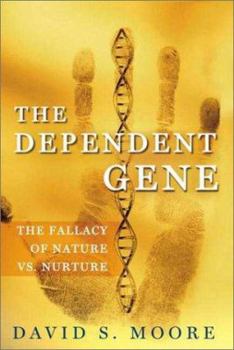The Dependent Gene: The Fallacy of "Nature vs. Nurture"
Select Format
Select Condition 
Book Overview
A masterful guide to human development that redefines the nature versus nurture debate A much-needed antidote to genetic determinism, The Dependent Gene reveals how all traits-even characteristics... This description may be from another edition of this product.
Format:Hardcover
Language:English
ISBN:0716740249
ISBN13:9780716740247
Release Date:January 2002
Publisher:W. H. Freeman
Length:320 Pages
Weight:1.34 lbs.
Dimensions:1.1" x 6.4" x 9.6"
Customer Reviews
2 ratings
The Developmental Systems Perspective
Published by Thriftbooks.com User , 19 years ago
The Dependent Gene is a deeply thoughtful and carefully articulated synthesis of contemporary genetics, developmental biology and evolutionary principles. Thus, it transcends the gene-centric propositions that directed much biological science in the 20th century, and that pervades today in such starkly different venues as repair shops and hospital chart rooms, where a repairman or a psychiatrist might explain human traits and behavior with "It's in the genes." (cf. D. Nelkin & M.S. Lindee, The DNA Mystique). Professor Moore's penetrating expose of the nature versus nurture fallacy is a sizeable accomplishment because as Stephen Jay Gould has written: "Thinking in dichotomies may be the most venerable (and ineluctable) of all human mental habits." (S.J. Gould, The Structure of Evolutionary Theory). The author, a professor of psychology at Pitzer College and the Claremont Graduate University, invites the reader's curiosity with such charming chapter headings as - From Aristotle's Wonder to a Fork in the Road: The Wrenching of Genetics from Development; Dependent Genes: Essential Biology and DNA; A Turtle in the Shade: The Development of Sexual Characteristics; Chicken Shoes and Monkey Foods: The Not-so-Subtle Effects of Some Very Subtle Postnatal Experiences; On Big Muscles and Facial Hair: Reconsidering "Inherited," "Acquired," and "Innate." Through aptly chosen vignettes we learn how to speed up the metamorphosis of a tadpole into a frog and how a tree can grow from its top to its roots rather than the usual way. In the process we acquire an understanding of "The Developmental Systems Perspective" that melts the arbitrary and artificial boundaries between genomic processes and human development. The book is separated into five sections: Part I: Where We're Going, Where We've Been; Part II: Background Basics; Part III: Developmental Systems; Part IV: Development and Evolution (by itself, worth the price of the book); Part V: Implications (for the philosophically and policy minded). Taken as a whole, one gets a clear sense of what a fine teacher Professor Moore is. The concepts he presents are not easy ones (for example DNA machinery, immediate early genes, epigenetics, heritability, neoteny) yet, through a careful step-by-step propaedeutic, highly abstract concepts are made real and the hard work of synthesis is made accessible. This fine book will likely be enjoyed by lifetime learners as well as advanced undergraduates and graduate students.
Beyond the Gene Myth
Published by Thriftbooks.com User , 22 years ago
This book is one of the clearest and most convincing critiques of genetic determinism, availing itself of a new, or renewed, developmental perspective. The nature-nurture debate was always an exercise in futility, but here, armed with a new approach, the issues seem to resolve themselves almost transparently. The resurfacing of this developmental perspective in the last decade, even as evolutionary psychology and sociobiology move into the mainstream, is both timely and a source of essential information for those confused by the Darwin debate, with its high powered promotions of genetic reductionism, and the misleading promises of the Human Genome project. It was always hard to resist the rigid claims based on Mendelism, but now we can see there is no alternative, a lesson, after all these years, to remember, think before the experts tell you what constitutes science. Demonstrating the many confusions here starting with those of Galton, and Weismann, and tracing the embryological perspective all the way back to von Baer in the early nineteenth century, the author shows how the emergence of population genetics derailed developmentalism, leading to the now dominant one-sidedness of the Neo-Mendelian Synthesis, which is not able to account for the relationships of genes in relation to environments. The sidelined corrective of Gerstang and de Beer is now seen to be the source of a newly consolidating research perspective, now envigorated by new knowledge of regulatory genetics. The confusion of genes and traits is reviewed in a very clear and convincing account, with a remarkable discussion of Lamarck's ideas, their direct relevance, and limitations. The end result is a fascinating new approach to the idea of evolution based on traits at the level of phenotype, a view, by the way, pointed to by Ernst Mayr, long ago. I think here the author is too kind to Darwin and still with the reflex over Lamarck. For now we are given the variant of Darwin whereby his later Lamarckism makes him prefigure the new developmentalism, even as Lamarck is given but a brief pat on the back. That is surely not quite the right history in the middle of what must be an important new outlook very much on the right track. This is a very useful and important book for those on the defensive in the current environment of genetic fundamentalism. However, although the new perspective is essential as a new foundation for any theory of evolution, I think that this new and inevitable paradigm will still fall short of a full theory of evolution. But that is another story, as one can only hope this new point of view will enable a swift exit from the current dominant confusion.





